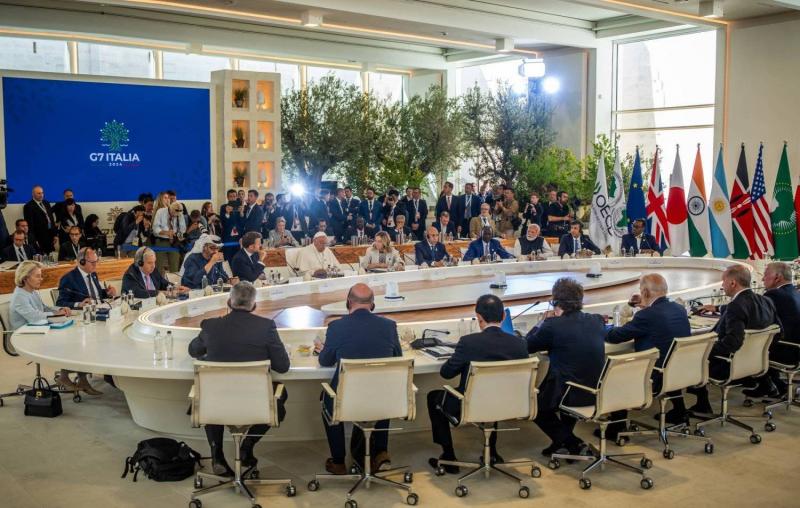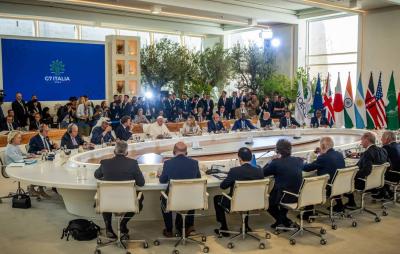Since its establishment in 1973 at the behest of the United States, the summit of industrial nations has never starkly mirrored the unprecedented political turmoil affecting major Western democracies as it does in this summit hosted by Italy for the seventh time, with a woman leading its government for the first time, who is notably the only guest unconcerned about her political future in the near term.
American President Joe Biden, French President Emmanuel Macron, and German Chancellor Olaf Scholz face extremely difficult electoral and political challenges, while British Prime Minister Rishi Sunak is not among the frontrunners in the upcoming elections, and Canadian Prime Minister Justin Trudeau and Japanese Prime Minister Fumio Kishida are experiencing significant declines in public support. Notably, the one who dared to diagnose this political turmoil in his statements was not a G7 leader, but a guest at the summit, Brazilian President Luiz Inácio Lula, who upon arrival stated, "We have a problem, which is that democracy is in danger due to those who do not respect institutions, such as parliament and the judiciary."
However, the fragility of the political situations experienced by most leaders present did not prevent the adoption of important decisions on the first day, such as a "preliminary political agreement" regarding financing a $50 billion aid package for Ukraine from the revenues of frozen Russian assets in the West. A lengthy session was also dedicated to the tense relations with China, which demonstrated complete harmony among the group members regarding how to deal with Beijing, especially concerning trade policy and what the Western countries describe as "industrial overproduction surplus" in clean technology and its derivatives, which has been flooding global markets.
The European Union recently announced its intention to impose high tariffs on Chinese electrical exports, provoking a strong response from Beijing, which threatened to resort to the World Trade Organization. The United States was once again able to persuade its G7 allies to include a clause in the final statement opposing China's military activities in the Asia-Pacific region, sending a message to the Chinese leadership that the situation in that area is a cause for concern for all member countries.
As Pope Francis' helicopter landed midday Friday just meters from the summit venue, participants were focused on the statements released by Russian President Vladimir Putin, who proposed a ceasefire in exchange for Ukraine withdrawing from the Donbas, Luhansk, Kherson, and Zaporizhzhia regions, as well as abandoning its NATO membership aspirations. The first response to Putin's statements came from NATO Secretary-General Jens Stoltenberg, who stated at the end of a NATO Defense Ministers council, "These statements are not a peace proposal, but an act of aggression. Russia, not Ukraine, should withdraw its forces from these areas, and this proposal implies that Russia has the right to occupy more Ukrainian territory." The U.S. Secretary of Defense emphasized that Russia is not in a position to impose peace terms after unlawfully occupying Ukrainian territories.
However, the most explicit and far-reaching response to the Russian president's statements came in the consensus text of the draft final declaration, which expresses the G7 countries' determination to "achieve a comprehensive, lasting, and fair peace in Ukraine, in accordance with international law, and to stand by Kyiv for as long as it needs support." The draft declaration reiterates that financing the aid package to Ukraine from the revenues of frozen Russian assets in the West, mostly in Europe, sends a clear message to Russian President Vladimir Putin.
The draft final statement endorsed the G7's support for a peace summit on Ukraine, which will take place this weekend in Geneva, and for the plan laid out by President Volodymyr Zelensky, which calls on Russia to compensate for the war damages it caused. Additionally, sources from the Japanese delegation indicated that the Japanese government is considering imposing a new package of sanctions on Russia, similar to those taken by the United States and other G7 member countries. A spokesperson for the Japanese delegation stated, "We aim to impose severe sanctions to prevent Russia from circumventing sanctions imposed by third parties." Furthermore, "These new sanctions target entities and individuals in countries such as China, India, the UAE, Uzbekistan, and Kazakhstan."
After the leaders of the seven nations expressed their full support for the American proposal to end the war in Gaza and urged both parties to accept it, there was notable diplomatic activity in the summit halls following Pope Francis' arrival, addressing the deteriorating situation on the Lebanese-Israeli border, involving delegations from France, the United States, the European Union, Italy, and the Vatican. A senior Vatican source told "Asharq Al-Awsat" that the Pope is closely following developments in southern Lebanon and has instructed efforts to prevent further escalation and to reach a lasting agreement between the parties.
The draft text of the final statement called on Iran to cease supporting Russia in its war against Ukraine and to refrain from transferring ballistic missiles and technology to Moscow. The draft also emphasizes that "the G7 is ready to respond rapidly and in coordination among its members, with new harsher measures." It also demands that Iran "stop its destabilizing activities in the Middle East, under the threat of new sanctions." Regarding the ongoing war in Gaza, the draft declared: "We are deeply concerned about the repercussions of military operations in Rafah on civilians, and the catastrophic consequences that may arise from a massive military attack. We urge the Israeli government to refrain from conducting such an attack."




